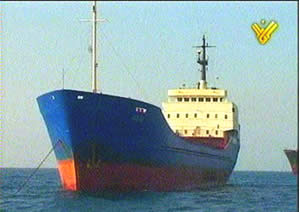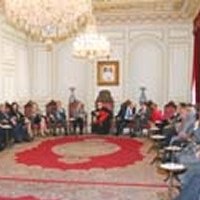Wed, June 23, 2010 | Jerusalem Post | Intelligence and Terrorism Information Center
The Lebanese government is working towards canceling the planned flotillas to Gaza, Lebanese newspaper Al-Liwaa reported Thursday, according Israel Radio. The newspaper reported that the Lebanese government was interested in stopping the flotillas from reaching Gaza in order to calm down recent tensions in the area. Beirut fears an eruption in activity in South Lebanon due to the planned aid-ships. Sources cited in the newspaper claimed that Iran may also cancel a flotilla it was planning on sending to the Strip, Israel Radio reported. Al-Liwaa newspaper also reported that Hizbullah chief Hassan Nasrallah will not visit Turkey, due to Turkish Prime Minister Recep Tayyip Erdogan’s refusal to increase tensions between Washington and Jerusalem. [Jpost, Thu, June 24, 2010].
The aid flotilla planned to set sail from Lebanon is supported by Syria and Hezbollah. Its organizer, Yasser Qashlaq, called for “getting rid of the remainder of the garbage of Europe” [the Jews in Israel] and sending them back to their “homelands.”
Overview
1. The international media coverage given the last flotilla to the Gaza Strip and the political pressure exerted on Israel as a result led many organizations and one country to proclaim their intention to send more ships. On the agenda is the intention to dispatch two ships which are expected to set sail from Lebanon to the Gaza Strip. The first, the Nagi al-Ali,[1] is expected to carry 100 people, among them 25 European activists (some of the parliamentarians according to the organizers) and 50 correspondents. Another ship, the Maryam, is expected to set sail with 50-60 women aboard and a cargo of humanitarian assistance.
2. So far the organizers are being deliberately vague about the expected date of sailing. The date has been delayed because, among other reasons, of political pressure. However, the organizers still hope to have the ships set sail in the coming days, possibly through an intermediate destination, perhaps Cyprus.
3. In the meantime the organizers and Hezbollah have been exploiting the affair to launch a propaganda campaign against Israel, full of hatred and anti-Israeli anti-Semitic motifs. Yasser Qashlaq, the dominant figure in organizing the flotilla, declared that the ships over which the IDF takes control “will take the remainder of the European garbage” which came to Israel back to their homelands [See videos below]. Hezbollah’s propaganda network has been fully covering the events, trying to reinforce their media effect.
4. Responsible for dispatching the ships are low-ranking Lebanese activists who have no particular standing in Lebanon’s internal politics. Some of them belong to the March 8 Alliance, which supports Hezbollah and Syria. The two groups behind the operation are Journalists without Bounds and the Free Palestine Movement, two fairly minor organizations. In our assessment, purchasing the ships and organizing the flotilla were carried out with Syrian and Hezbollah involvement and support. Neither of them wants to expose its true identity.
Information about the Ships and the Status of their Sailing
5. The following is information about the two ships:
A. The Nagi al-Ali (registered in Paris as the Julia) – The ship is expected to carry 100 passengers, 25 of them European activists (according to the organizers, some of them parliamentarians) and about 50 correspondents. According to Hamas activist Jamal al-Khudari, chairman of the Popular Committee to Lift the Siege, there will be 12 senior American activists who formerly belonged to the Council for the National Interest[2] (Al-Watan, June 21, 2010). Jamal al-Khudari was also involved in preparations for the first flotilla.
B. The Maryam – A cargo ship, it is expected to carry between 50 to 60 women from Lebanon, Japan, China, the United States, and European and Arab countries, including a number of nuns. Its cargo will contain humanitarian assistance, especially medicine. Women on board are intended to create an additional difficulty for an Israeli attempt to stop the ship.
6. The Lebanese ministry of transportation initially posed difficulties for the organizers but in recent days, according to reports, most of the problems have been solved. Despite the declarations of the organizers that the ships are ready to set sail, no equipment has been seen loaded onto them (as of June 21). According to information, the two ships are supposed to leave Lebanon for Cyprus and from there to sail to the Gaza Strip. They will apparently not fly the Lebanese flag. So far it is not clear when they will set sail and whether they will sail together or separately.
The Flotilla’s Organizers
7. Behind the organization of the Nagi al-Ali are two fairly minor organizations headed by Yasser Qashlaq, a Syrian businessman:
A. Journalists without Bounds
B. The Free Palestine Movement
8. Samar al-Hajj, a Christian from Lebanon is represented as the organizer of the Maryam. According to Rima Farah, spokeswoman for the ship, the idea of a ship of women came from a group of Lebanese women who, after the last flotilla, wanted to “show that they are not afraid of Israeli threats” (Al-Markazia, June 20, 2010).
9. In our assessment, both purchasing the ships and organizing the flotilla were carried out with the involvement and support of Syria and Hezbollah. Neither of them wants to expose its true identity (lest they involve themselves in complications with Israel). They hide behind fictitious front organizations and activists who do not have meaningful influence in the internal Lebanese arena (a modus operandi frequently used in Lebanon in the past, inventing fictitious terrorist organizations to hide the genuine identities of the organizations).
Chief Activists behind the Flotilla and Their Statements
10. Many of the activists involved in organizing the flotilla, especially senior members of Journalists without Bounds (Thaer Ghandour, Rafiq Nasrallah, Ziyad Itani), are lower rank activists with little political influence in internal Lebanese affairs. Some of them belong to the pro-Syrian pro-Hezbollah March 8 Alliance, some of them even ran for office in the 2009 elections.
11. Some of the activists mentioned by the media as involved in organizing the ships were the following:
A. Yasser Jabber Qashlaq, chairman of the Free Palestine Movement:
1) A businessman who was born in Damascus and whose family originally came from Safed in the northern part of Israel. He calls himself chairman of the Free Palestine Movement in Lebanon and founded a forum of Palestinian businessmen. He writes for a number of Arab newspapers and magazines, especially about politics and economics. He was involved in organizing previous protest sea voyages to the Gaza Strip. During 2009 the Lebanese newspaper Al-Safir reported his involvement in funding a ship (apparently in the “spirit of humanitarianism”) which would make it possible to “break the siege” of the Gaza Strip. Interviewed by Hezbollah’s Radio Nur, he said that dispatching the ships “is a very important step, because it made the Zionist enemy afraid, and constant worry is an achievement in itself” (Radio Nur, June 9, 2010).
2) Interview with Yasser Qashlaq on Al-Manar TV: “A day will come when the ships will carry the remainder of the European garbage which came to my homeland [i.e., Israel] and return them to their homelands. Gilad Shalit will go back to Paris and those murderers [the leaders of Israel] will go back to Poland. And after they go back we will chase after them to the end of the world in order to bring them to justice for those massacres from Dir Yasin till today.”
Yasser Qashlaq, among Organizers of Lebanese Flotilla
httpv://www.youtube.com/watch?v=x9SHlLy3qLU
B. Samer Haydar is a member of Journalists without Bounds.
C. Paul Larudee, head of the Free Palestine Movement in the United States, was born in California and was one of the founders of Free Gaza. He left the organization after internal conflicts and established the Free Palestine Movement. He has taken part in many protest voyages and was a passenger aboard the Sfendoni (Boat 8000) in the last flotilla.
12. Journalists without Bounds activists:
A. Thaer Ghandour – Lebanese, serves as chairman of the organization, writes for the daily Lebanese Hezbollah-affiliated Al-Akhbar. He is affiliated with the March 8 Alliance and as an independent candidate ran for the Lebanese Parliament representing the Alliance in the 2009 elections.
B. Rafiq Nasrallah – Lebanese Shi’ite, director of the International Center for Media and Research in Beirut. He is a well-known media figure in Lebanon and affiliated with the March 8 alliance. As an independent candidate he ran for the Lebanese Parliament representing the Alliance in the 2009 elections. In the past he served as director of the Abu Dhabi channel in Lebanon, director of the UAE’s Al-Ittihad office, a lecturer at the Lebanese University and a member of the board of directors of TeleLiban.
C. Ziyad Itani – A Lebanese journalist who writes for Al-Anbaa. Affiliated with the March 8 Alliance, he ran as an independent candidate for the Lebanese Parliament representing the Alliance in the 2009 elections.
13. Main activists aboard the Maryam:
A. Samar al-Hajj – Christian, wife of Ali al-Hajj, a former senior Lebanese security officer who was suspected of involvement in the murder of Rafiq al-Hariri in 2005. In an interview with Al-Arabiya TV, she said, “We say to the Israeli government: We do not recognize you. Pardon me, but that’s how we were brought up. We do not recognize the Zionist entity. We are going to Gaza’s territorial waters and I don’t advise…Pay attention: I don’t advise [to stop the ship] because the Lebanese flag won’t be the only one aboard the Maryam.”
B. Iman Tawil Sa’ad – Of Egyptian extraction, married to a Lebanese who heads the Lebanese Nasserist organization, a leftist organization whose power anti-Semitism is in Sidon. In an interview with Al-Jazeera TV she said, “We’re going (to Gaza) and honestly we have three options…Either martyrdom, imprisonment or victory. Allah willing, we will be victorious and reach Gaza.”
C. Rama Farah – Ship’s spokeswoman (Al-Markazia, June 20 2010).
D. Wafaa ‘Awad – A member of the organizing committee (Al-Quds, June 20, 2010).
E. Mai Kharish – Said in an interview that she was married and had four children. She also said the women on board the ship are “women of the resistance” but without weapons (Al-Quds, June 20, 2010).
F. Rajaa Bishara – Denied Hezbollah had any connection to the ship (Al-Quds, June 20 2010).
Hezbollah’s Position
14. In principle, Hezbollah supports more aid flotillas to the Gaza Strip. On June 4 Hezbollah leader Hassan Nasrallah gave a speech at a rally held following the IDF takeover of the Turkish flotilla. He said that more and more ships should be sent. He also called for greater numbers of Lebanese participants in flotillas in the future. He said that “Today the European delegation announced a call to join flotilla number two, and so far it has received hundreds of requests from Europe. Where are the Arabs? Where are the Muslims? Where are the Arab and Islamic people?… Israel, as it will be accountable to Turkey, and as it will be accountable to the red flag [i.e., Turkey], so will it be accountable to the yellow flag [i.e., Hezbollah]…Those Lebanese who participate in flotilla number two should know well that they belong to the country, the people, the resistance [i.e., Hezbollah]… We Lebanese are also part of this human, ethic, national, Arab, faithful participation. And we will not leave the issue to those who come from across the sea” (Al-Manar TV, June 4, 2010).
15. However, Hezbollah is careful not to publicly affiliate itself with the Lebanese flotilla, out of fear of complications with Israel. Another reason is the understanding that it will harm their ability to represent the flotilla as reflecting a human rights effort. In response to many articles in the media, Hezbollah issued an explicit denial of its involvement. It said in a statement that the organization kept strictly uninvolved so that Israel would not have excuses. Yasser Qashlaq, the flotilla’s organizer, claimed that there was no connection between the ships and Hamas, Hezbollah or Iran. However, before the events of the last flotilla (the takeover of the Mavi Marmara) and especially after it, Hezbollah’s propaganda network gave the events thorough coverage. There has also been extensive involvement of the Hezbollah-affiliated media in covering the current Lebanese flotilla to increase its media effect.
16. The organizers of the ships repeatedly state in interviews with the media that they have no connections with Hezbollah. For example, Rima Farah, the spokeswoman for the Maryam, said that the ship was not supported by Hezbollah (an Arab word meaning the party of Allah) but by “the party of the mother of Allah” (a nickname for the Virgin Mary). Samar al-Hajj, one of the organizers, said that there were no women from Hezbollah aboard the ship (Al-Arabiya TV, June 17, 2010).

Samar al-Hajj and her husband meet Hassan Nasrallah (Al-Safir, May 25, 2010). She claimed the visit was held ten days before the events of the Mavi Marmara (Al-Quds, June 20 2010).
The Lebanese Government’s Position
17. The Lebanese government does not want a confrontation over the issue of the ships and is attempting to pass the problem along to Cyprus (UNIFIL forces warned the government that providing authorization for the ships would be a violation of UN Security Council Resolution 1710). The Lebanese government, using various excuse, rejected the ships’ request to anchor in the port of Tripoli (in the north of Lebanon). Only on June 21 did Ghazi al-Aridi, Lebanese minister of transportation, authorize the sailing of the two ships from Tripoli to Cyprus (Al-Nahar, June 21, 2010). He said that the continuation of the voyage now depended on whether or not Cyprus decided to let the ships sail (Al-Nishra, June 20 2010).
Notes:
[1] Nagi al-Ali, for whom the ship is named, was a Palestinian cartoonist (real name Salim Hussein). He created a character symbolizing for the Palestinians their suffering, the silence of the Arab world and their aspiration for “freedom.” Some 40,000 cartoons are attributed to him. He was gunned down by an unknown assassin in London in 1987. Born in a village in the north of Israel, he fled in 1948 with his family to the Eyn al-Hilweh refugee camp near Sidon in south Lebanon. He was detained by the Israeli forces in Lebanon and also by the Lebanese army.
[2] The Council for the National Interest is an American organization which based in Washington which advocates “Middle East policies that serve the American national interest.” It was founded in 1989 by two former Congressmen. It criticizes Israel and pro-Israeli organizations such as AIPAC. It also monitors how American taxpayers’ money is used in the Gaza Strip, Judea and Samaria.



 RSS
RSS











Lebanese Gaza-Bound Ships Maybe Cancelled #israel #lebanon #gaza #flotilla http://j.mp/9Gwwi7
RT @CrethiPlethi: Lebanese Gaza-Bound Ships Maybe Cancelled #israel #lebanon #gaza #flotilla http://j.mp/9Gwwi7
RT @CrethiPlethi: Lebanese Gaza-Bound Ships Maybe Cancelled #israel #lebanon #gaza #flotilla http://j.mp/9Gwwi7: R… http://bit.ly/aOx1fR